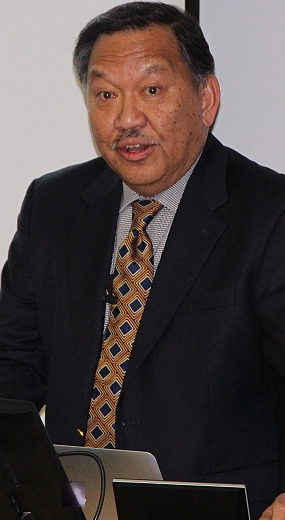

Prof. Baldomero OLIVERA
Former IAS Visiting Professor
Distinguished Professor of BiologyUniversity of Utah
Period of Appointment: 2014-2019
Prof. Baldomero OLIVERA
Former IAS Visiting Professor
Distinguished Professor of BiologyUniversity of Utah
Period of Appointment: 2014-2019
Research Areas:
Ion Channels, Membrane Receptors and Sensory Transduction
Prof. Baldomero Olivera received his PhD in Biophysical Chemistry from the California Institute of Technology (Caltech) and subsequently continued his postdoctoral research in biochemistry at Stanford University. He was a Research Associate Professor at the Department of Biochemistry at University of the Philippines College of Medicine, before moving to the University of Utah in 1972, where he is currently the Distinguished Professor of Biology. He is also an Adjunct Professor at the Salk Institute for Biological Studies, and at the Marine Science Institute, University of the Philippines. Since 2006, he holds concurrent appointment as a Howard Hughes Medical Institute Professor.
Prof. Olivera’s major research interests are in the ion channels and receptors, which mediate signaling in the nervous system. He and his research group have isolated neurotoxins from the venoms of the predatory cone snails, Conus that target specific molecular isoforms of ion channels and receptors, and are characterizing the targets of some of these peptide toxins. His present work focuses on both ligand-gated and voltage-activated ion channels. His laboratory has characterized a set of unique toxins, the omega-conotoxins, which irreversibly bind (and block) these calcium channels; an ω-conotoxin discovered in his lab is now an approved drug for pain. His impressive research on both DNA biophysics and conotoxins has enabled him to serve on editorial boards of various scientific publications. He was part of the editorial boards of the Journal of Biological Chemistry (1982-1987), the Journal of Toxicology – Toxin Reviews (1990-1993), and Toxicon (2000-present). In addition, he was a member of the review committee of the journal Cellular and Molecular Basis of Disease (1982-1986).
Prof. Olivera is a Member of the US National Academy of Sciences and the US National Academy of Medicine, and a Fellow of the American Academy of Arts and Sciences and the American Philosophical Society. He was also a recipient of the Damon Runyon Fellowship Award, the Eli Lilly Unrestricted Research Award, the American Cancer Society Faculty Research Award, the Alexander van Humboldt Foundation Senior Scientist Award, and the Utah Governor’s Medal for Science and Technology. He was named 2007 Scientist of the Year by the Harvard Foundation.


